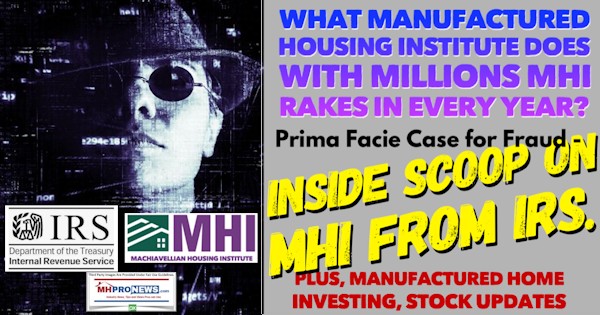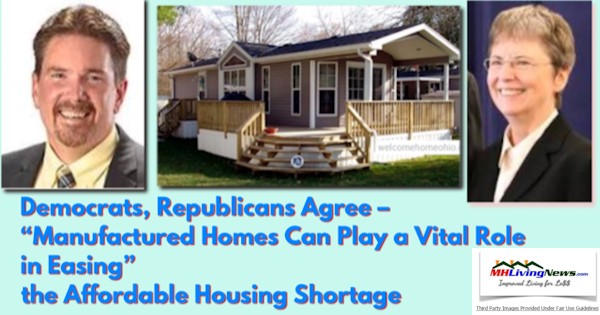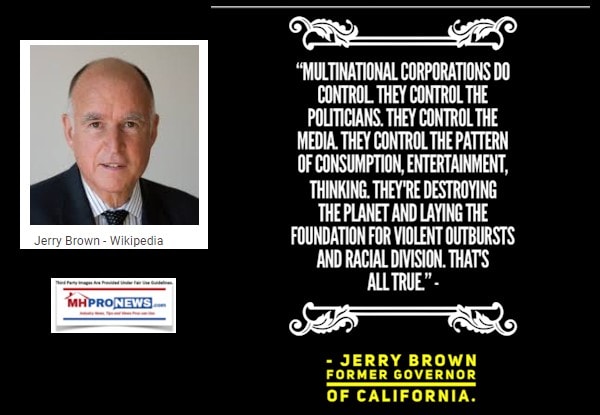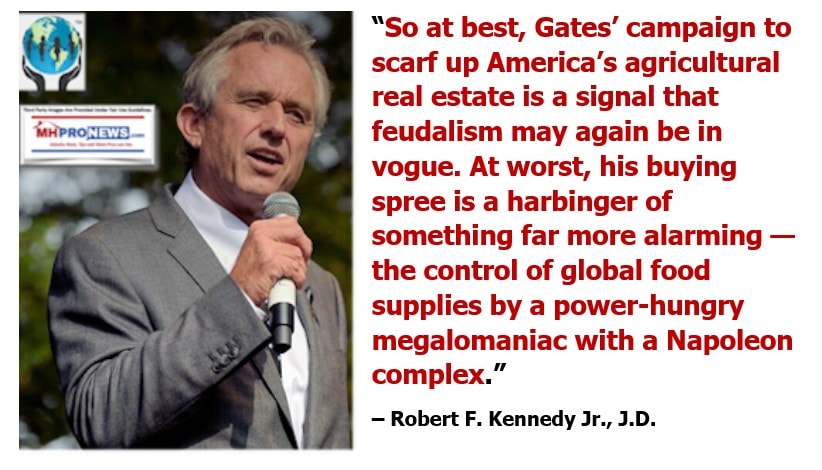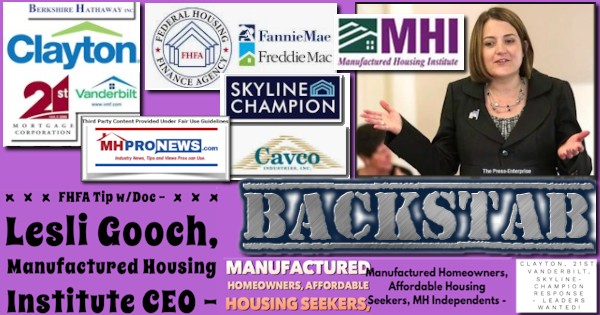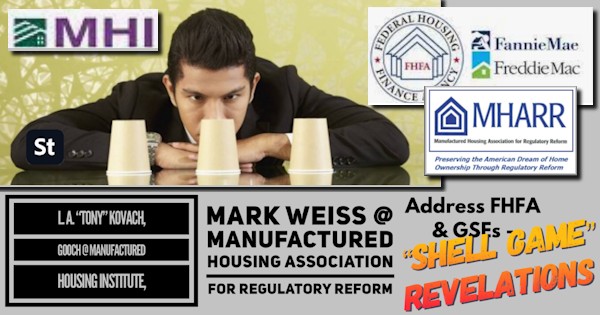Lesli Gooch, Ph.D., CEO of the Berkshire Hathaway-Clayton Homes backed Manufactured Housing Institute (MHI) said in previously filed comments that “The first 3-year period of the GSEs’ Duty to Serve process has ended, and the Enterprises are still making no progress in actually purchasing chattel loans.” Gooch also said: “…MHI is disappointed that Fannie Mae and Freddie Mac have not carried through on their Duty to Serve Market Plans to resume purchases of chattel manufactured homes…” She also wrote: “In 2008, the Housing and Economic Recovery Act of 2008 established a statutory Duty to Serve requirement for Fannie Mae and Freddie Mac. The statute requires Fannie Mae and Freddie Mac to serve three specified underserved markets – manufactured housing…” That might have been written by Mark Weiss, J.D., President and CEO of the Manufactured Housing Association for Regulatory Reform (MHARR). But Gooch also said this, which Weiss has not – and is unlikely to – say. “In 2008, the Housing and Economic Recovery Act of 2008 established a statutory Duty to Serve requirement for Fannie Mae and Freddie Mac. The statute requires Fannie Mae and Freddie Mac to serve three specified underserved markets – manufactured housing…”
That appears to be part of the purported “Shell Game” that MHARR CEO and attorney Mark Weiss has accused the FHFA, Fannie Mae and Freddie Mac of engaging in.
While Gooch and MHI say such things and make such ‘positions’ available to their members/readers via email, they are routinely missing from MHI’s own website. The screen captures below – performed earlier today – illustrate.
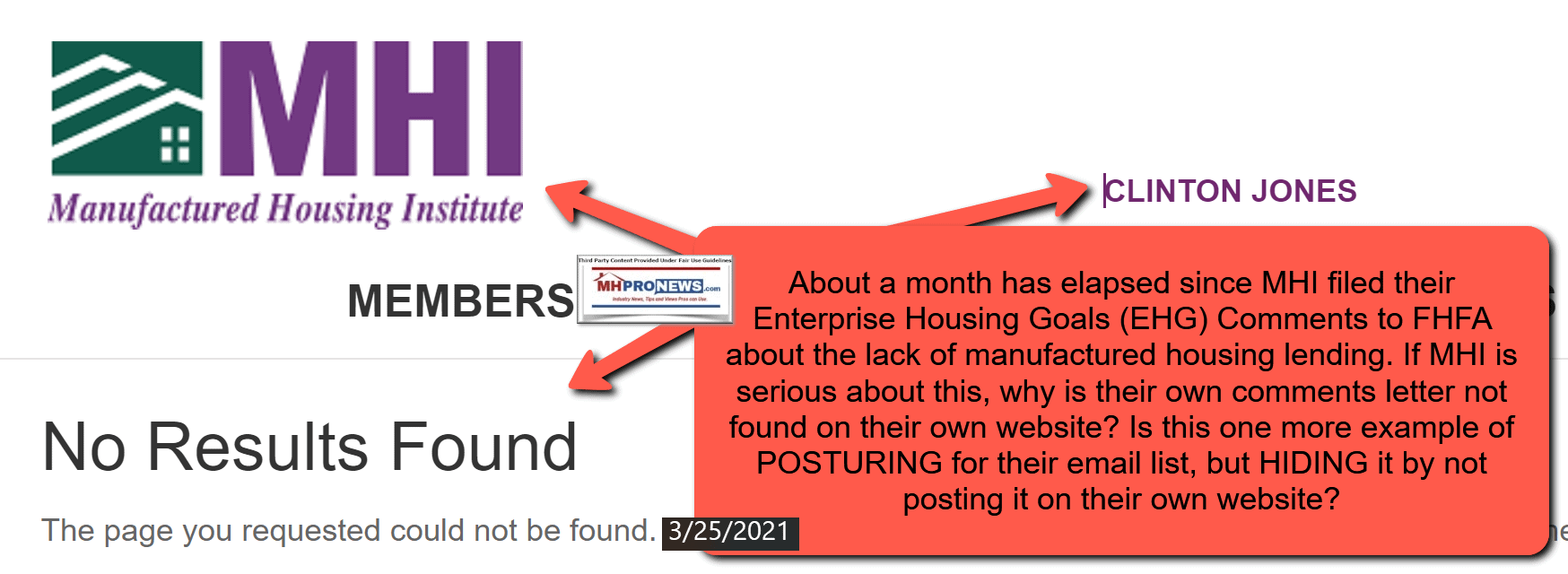
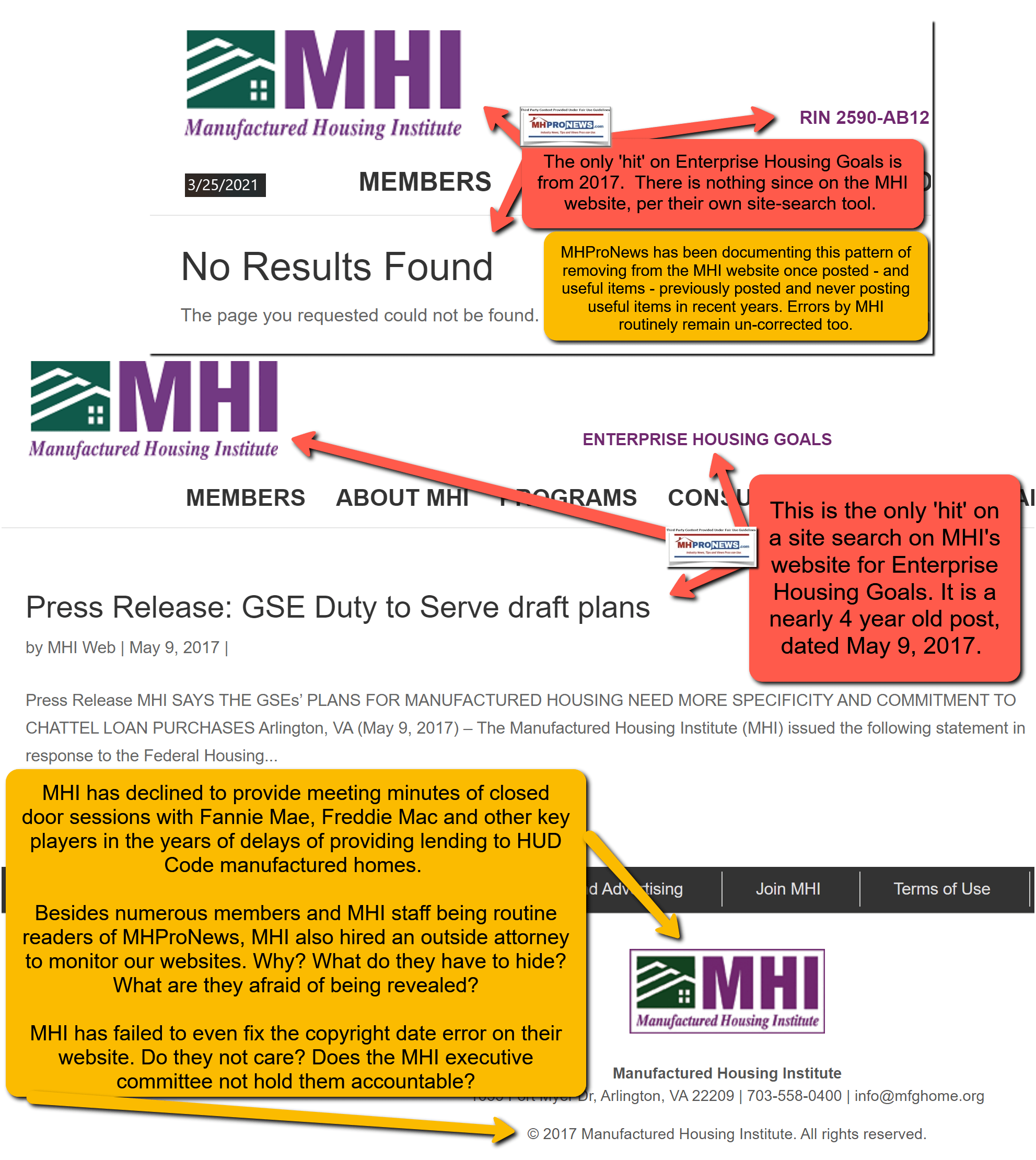
This is arguably part of the “Iron Triangle” and “Sabotage Monopoly” tactics that third-party Federal Reserve, other experts and legal researchers have documented. The powers that be at MHI – in apparent collusion with federal and GSE officials – are accused of posturing one thing, but doing something entirely different that just happens to benefit Berkshire Hathaway owned brands and their allies. Uh huh. Gooch’s documented history of arguable conflicts of interest have brought zero known repercussions from the MHI executive committee. Why?
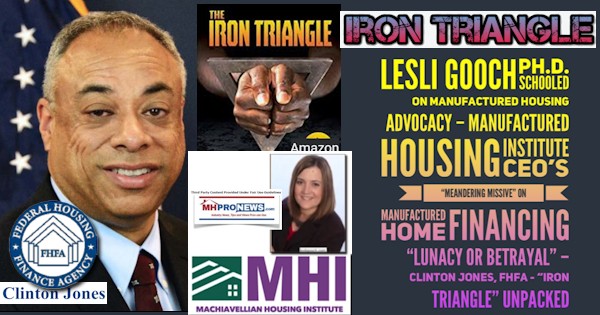
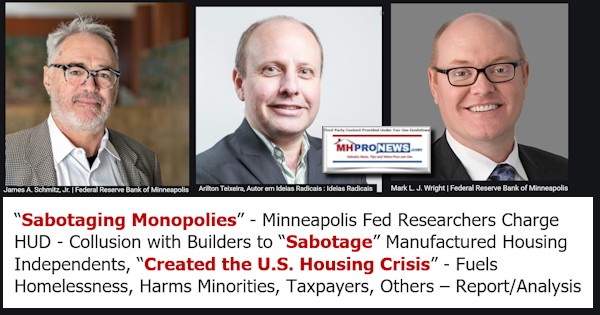
By contrast, when MHARR issues a press release via email, they post it soon thereafter on their own website. There are not only years, but decades of consistency at MHARR. MHARR has not flip flopped, or behaved in self-contradictory ways, as MHI has done on issues from finance, zoning and placement, or the upcoming battle on energy rules.

MHARR also makes their press releases to not only MHProNews, but they are also available to others in manufactured housing publishing and bloggers. Those who do not want to rock the boat with MHI and their ‘big boy’ masters routinely do not post MHARR releases, although there are periodic exceptions.
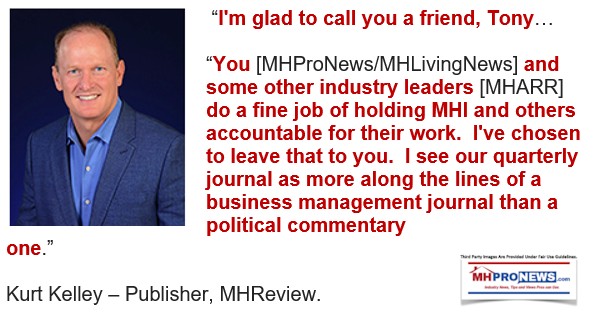
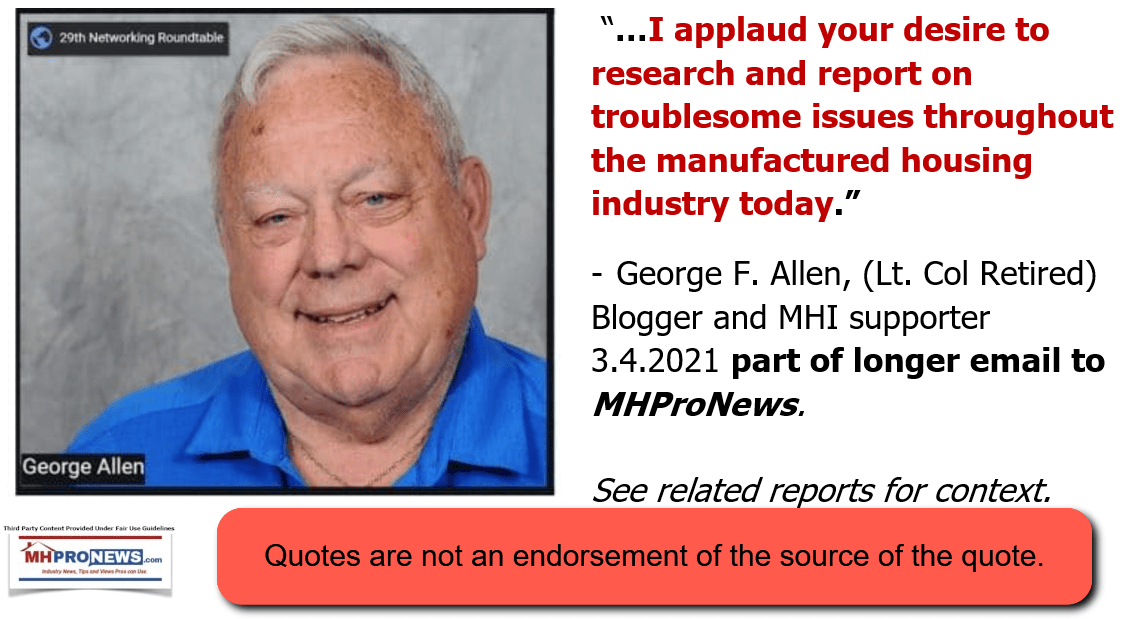
Advance Notice of Ruling – Enterprise Housing Goals (RIN 2590-AB12) MHI’s letter is linked here, and should be read in the light of the allegations of the above plus the documented conflicts of interest leveled against Gooch and her MHI corporate masters.
FOR IMMEDIATE RELEASE Contact: MHARR
(202) 783-4087
MHARR TO FHFA, FANNIE MAE AND FREDDIE MAC: STOP THE “SHELL GAME” WITH THE HUD CODE INDUSTRY AND AMERICAN HOMEBUYERS
Washington, D.C., March 25, 2021 – The Manufactured Housing Association for Regulatory Reform (MHARR) continues to expose an ongoing scheme by Fannie Mae, Freddie Mac and their federal regulator, the Federal Housing Finance Agency (FHFA), to exclude the vast bulk of the mainstream manufactured housing consumer financing market from the securitization and secondary market support mandated by Congress through the Duty to Serve Underserved Markets (DTS) provision of the Housing and Economic Recovery Act of 2008 (HERA).
In comments delivered at a public March 25, 2021 FHFA “Listening Session” (see, copy attached), MHARR told FHFA, Fannie Mae and Freddie Mac that the “shell game” that all three entities have been playing with HUD Code manufactured housing while failing to provide support for such lower and moderate-income homebuyers as required by federal law, must end.
The manufactured housing “shell game” began in 2010, when FHFA deleted manufactured homes from its Enterprise Housing Goals (EHG) for Fannie Mae and Freddie Mac, supposedly in anticipation of mainstream manufactured housing consumer loans being served by the Enterprises under DTS. More than a decade later, however, Fannie and Freddie, with the express approval of FHFA, have failed to provide any DTS-based support for the nearly 80% of the affordable mainstream manufactured housing consumer finance market represented by personal property (or “chattel” loans). Moreover, by limiting DTS support exclusively to an extremely small segment of real estate-based manufactured housing loans, Fannie and Freddie have failed to serve 93-94% of the entire manufactured housing market.
Meanwhile, the Enterprises, again with the express support of FHFA, have simultaneously sought to divert DTS support to much more costly, non-mainstream, “boutique” factory-built homes, variously referred to as “MH Advantage,” “ChoiceHome” or “Cross-Mod” homes. As a result of these actions, both the Enterprises and FHFA have – and are – totally failing to serve the lower and moderate-income homebuyers within the mainstream manufactured housing market that Congress sought to benefit through DTS.
In light of FHFA’s failure to affirmatively require expanded, market-significant support for mainstream manufactured home consumer loans under DTS, MHARR in its Listening Session statement and in more detailed written comments filed with FHFA on February 26, 2021 in connection with an Advance Notice of Proposed Rulemaking (ANPR) on modifications to the 2022 Enterprise Housing Goals, calls for such support to again be included in the EHG regulations, as an addition and supplement to the existing DTS final rule.
The Manufactured Housing Association for Regulatory Reform is a Washington, D.C.-based national trade association representing the views and interests of independent producers of federally-regulated manufactured housing.
— 30 —
That MHARR press release teed up this statement by Mark Weiss, J.D., as prepared for today’s FHFA “listening session.”
STATEMENT OF MARK WEISS
MARCH 25, 2021 ENTERPRISE HOUSING GOALS LISTENING SESSION
My name is Mark Weiss, and I am President and CEO of the Manufactured Housing Association for Regulatory Reform (MHARR).
MHARR, based in Washington, D.C., represents independent producers of manufactured housing regulated under federal law by the U.S. Department of Housing and Urban Development (HUD).
MHARR’s member companies are located in and produce homes that are sold in all regions of the United States.
Manufactured homes are specifically recognized – and protected – under federal law as a leading source of non-subsidized, inherently affordable homeownership, and are regulated under a system that is expressly designed to maintain their affordability in a manner that is consistent with both quality and consumer safety.
Because manufactured homes are federally-regulated under a system that is designed to maintain their inherent affordability, the average structural price of a manufactured home in 2019, according to the U.S. Census Bureau, was $81,900, while the average structural price of a site-built home that same year, was $299,415. Put differently, the cost of an average site-built home is 265% greater than the cost of a manufactured home.
Because of this price advantage and the crucial role that inherently affordable manufactured housing could — and should — play in alleviating the nation’s affordable housing crisis, Congress specifically included HUD-regulated manufactured housing as part of its “Duty to Serve Underserved Markets” (DTS) mandate, enacted in 2008.
Thirteen years after the enactment of the DTS mandate, however, the vast bulk of the mainstream manufactured home consumer lending market represented by personal property (or “chattel”) loans remains completely unserved under DTS.
Nor is there any pending plan or target for the Enterprises to serve the manufactured housing chattel market under DTS through at least the end of 2021, based on DTS implementation plans already reviewed and approved by the Federal Housing Finance Agency (FHFA).
Consequently, more than a decade after the enactment of DTS to, among other things, increase mainstream manufactured housing consumer loan market support by Fannie Mae and Freddie Mac, the nearly 80% of all manufactured home loans represented by chattel obligations, have been completely excluded.
Meanwhile, Fannie and Freddie – with the overt blessing of FHFA – have prioritized DTS support for a much smaller and much more costly set of “boutique” manufactured homes, titled as real property and denominated as “MH Advantage,” “ChoiceHome,” or “Cross-Mod” homes. These homes, which are produced almost entirely by the industry’s largest corporate conglomerates, are totally outside of the industry’s mainstream and represent only a miniscule number of originations.
Consequently, the vast bulk of the manufactured housing consumer lending market continues to be entirely ignored by Fannie and Freddie under DTS. Indeed, purchases of manufactured housing real estate loans by both Enterprises constituted just 5% of the new HUD Code manufactured housing market in 2017, 5.78% of the new HUD Code market in 2018, and just 6.46% of the new HUD Code market in 2019. By contrast, that left 93% of the new HUD Code market completely unserved under DTS in 2019, and more than 94% of the new HUD Code market completely unserved under DTS in both 2018 and 2017.
This represents a “double-whammy” for manufactured housing and lower and moderate-income mainstream manufactured housing consumers, because FHFA, contemporaneously with its proposal of a DTS “implementation” rule in 2010, removed manufactured homes – which had previously been part of the Enterprise Housing Goals (EHG) – from that program.
Prior to 2010, as FHFA has acknowledged, the EHG “regulation defined the term ‘mortgage’ to include a loan secured by ‘a manufactured home that is personal property under the laws of the state in which the manufactured home is located.”
The exclusion of manufactured home personal property loans from EHG, together with their simultaneous exclusion from DTS to date, has left mainstream, affordable manufactured homes and mainstream, affordable manufactured home consumers out in the cold, with no support whatsoever from the Enterprises under any program. This represents both a broken promise to manufactured housing consumers and open defiance of Congress, which made clear its intent to ensure a market-significant level of support for affordable, mainstream manufactured housing.
As a result of FHFA’s exclusion of mainstream manufactured housing personal property loans from both EHG and DTS, through an illegitimate regulatory “shell game,” the vast bulk of the mainstream manufactured housing consumer financing market is not currently being served by the Enterprises under either DTS or the Enterprise Housing Goals.
Following the 2010 “mortgage” definition regulatory modification that deleted Enterprise Housing Goals credit for purchases of personal property manufactured housing consumer loans, FHFA publicly stated its willingness to restore such credit in a “future rulemaking.”
That “future rulemaking” should – and must — be now. Now is the time for Fannie and Freddie to stop making excuses for failing to implement chattel manufactured home loan support under DTS. And now is the time for FHFA to finally require market-significant Enterprise support for such loans under both DTS and the Enterprise Housing Goals.
The facts have shown, over the past decade-plus, that FHFA’s linkage between DTS and EHG with respect to manufactured home consumer lending support, has been a failure that has left manufactured homebuyers with virtually no support whatsoever, under both DTS and EHG, contrary to the express desire of Congress to promote, enhance and advance DTS support for mainstream manufactured housing loans and mainstream manufactured housing consumers.
That failed policy should be ended immediately and FHFA should take responsibility in ensuring that Congress’ objective to ensure strong secondary market support for mainstream manufactured housing consumer loans is achieved.
Accordingly, FHFA should both reincorporate mainstream manufactured home consumer lending support within EHG and require market significant manufactured housing support under DTS as well. “”
###
Consultant L.A “Tony” Kovach’s comments as prepared are found at this link below.

To learn more, see the related reports, linked above, below, and following the byline and notices.
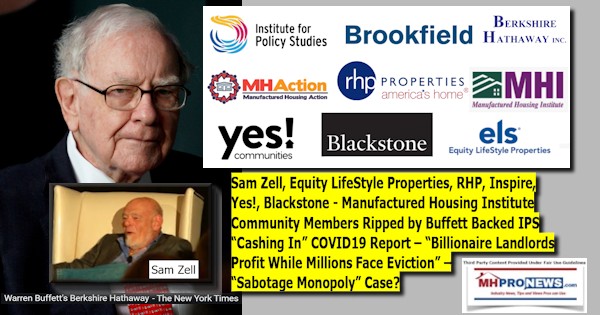
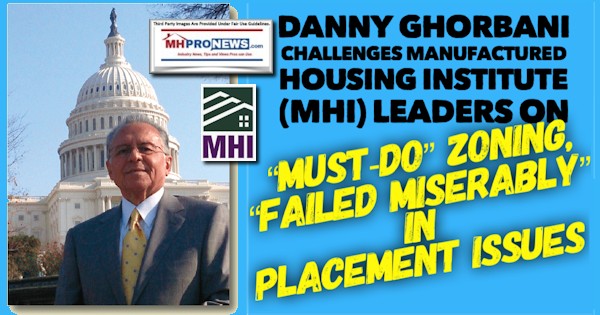
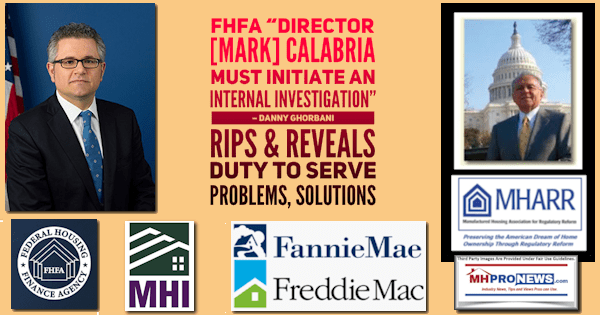
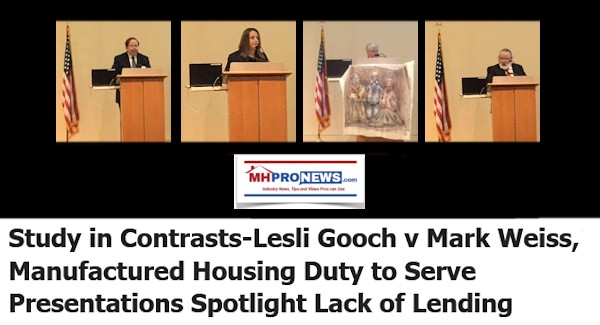
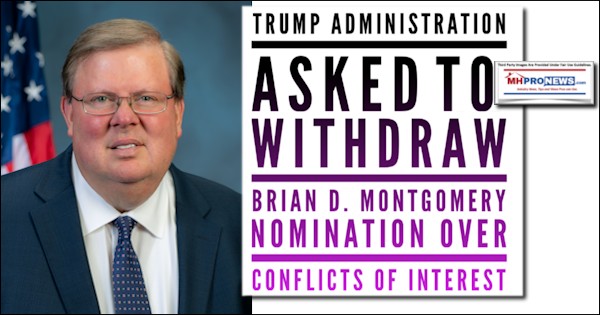
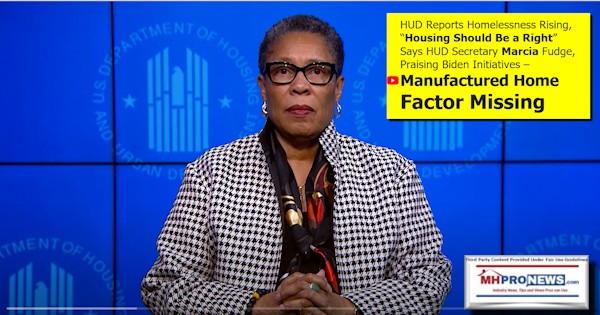

Stay tuned for more of what is ‘behind the curtains’ as well as what is obvious and in your face reports. It is all here, at the runaway largest and most-read source for authentic manufactured home “News through the lens of manufactured homes and factory-built housing” © where “We Provide, You Decide.” © ## (Affordable housing, manufactured homes, reports, fact-checks, analysis, and commentary. Third-party images or content are provided under fair use guidelines for media.) (See Related Reports, further below. Text/image boxes often are hot-linked to other reports that can be access by clicking on them.)

By L.A. “Tony” Kovach – for MHProNews.com.
Tony earned a journalism scholarship and earned numerous awards in history and in manufactured housing.
For example, he earned the prestigious Lottinville Award in history from the University of Oklahoma, where he studied history and business management. He’s a managing member and co-founder of LifeStyle Factory Homes, LLC, the parent company to MHProNews, and MHLivingNews.com.
This article reflects the LLC’s and/or the writer’s position, and may or may not reflect the views of sponsors or supporters.
Connect on LinkedIn: http://www.linkedin.com/in/latonykovach
Related References:
The text/image boxes below are linked to other reports, which can be accessed by clicking on them.
